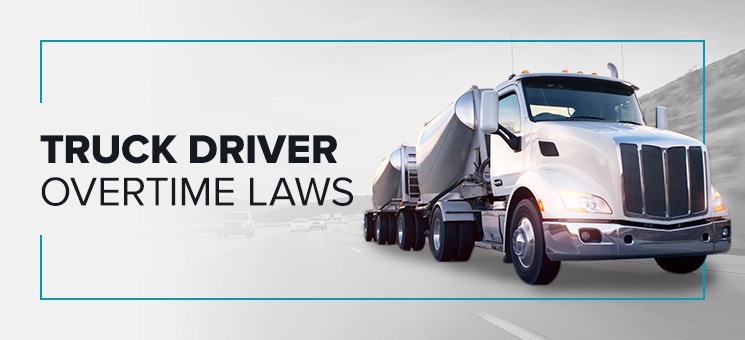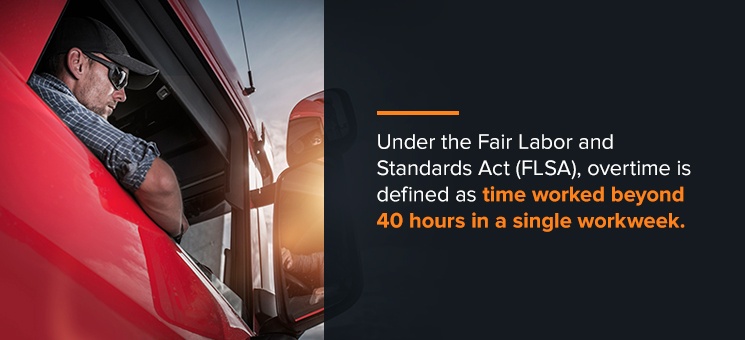By Weisberg Cummings, P.C. on October 26th, 2020
As a truck driver, understanding the laws that impact your profession is crucial to ensuring your rights are not infringed upon. While many commercial drivers are not entitled to overtime pay, some drivers may be eligible. Whether you are eligible for overtime pay is dependent on several factors, such as job duties and classification as an employee or contractor.
Which drivers may be able to receive overtime pay? Which drivers may not be eligible for overtime under the Fair Labor and Standards Act (FLSA) Motor Carrier Exemption? Are local delivery drivers exempt from overtime? At Weisberg Cummings, P.C., we have developed this guide for those who have questions and concerns about overtime for truck drivers.
Are Truck Drivers Eligible for Overtime Pay?
A truck driver spends long days on the road, and a typical workday includes tasks such as completing logs, performing vehicle inspections and loading and unloading vehicles. Truck drivers often put in overtime hours, but are not compensated with overtime pay from their employer or trucking company.
The Fair Labor Standards Act has established standards for overtime, along with additional wage and employment concerns like recordkeeping and minimum wage. Under the FLSA, overtime is defined as time worked beyond 40 hours in a single workweek. Under this act, many types of truckers are entitled to overtime pay, including:
- Tow truck drivers
- Salt truck drivers
- Water truck drivers
- Armored truck drivers
- Snowplow truck drivers
Drivers of semitrucks who regularly cross state lines for deliveries may be included under the Motor Carrier Act rather than the FLSA. An employee covered by the FLSA who works more than 40 hours a week may be eligible for 1 1/2 times his or her regular pay rate. For example, an employee who makes $8.00 per hour will have an overtime pay rate of at least $12.00.
In Pennsylvania, non-exempt employees are entitled to 1 1/2 hours of overtime beyond the standard 40 hours a week. Do you believe your employer may be violating truck driver overtime laws? Reach out to an experienced attorney who understands the law and can help you take legal action.
How Does the Fair Labor Standards Act Protect Truck Drivers?
Under FLSA, whether you are entitled to overtime protections as a truck driver can be a complex question. While some are protected by the act, many drivers are not. Instead, these drivers fall under the FLSA Motor Carrier Exemption. The factors that determine your eligibility include:
- The size of your vehicle
- Whether you are an owner and operator
- Whether you travel over state lines
- Whether you are an independent contractor
- Whether you are an employee or a trucking company
- Whether you are transporting goods that have crossed or will cross state lines
A truck driver is often entitled to overtime pay if he or she works more than 40 hours in a week. If you are paid by the day, you may also be eligible for overtime pay. Employers frequently violate the FLSA by not paying the required overtime pay to their day-rate workers.
The following types of truck drivers, in particular, should understand their rights in winter months, during which their services are needed often and at any time of the day or night:
- Snowplow drivers
- Tow truck drivers
- Salt truck drivers
If you are a truck driver, you may want to determine whether you fall under the protection of the FLSA or under the Motor Carrier Exemption. Along with the FLSA laws for overtime pay, some states have their own laws for overtime pay that differ slightly. Partnering with an experienced attorney can help you determine if you are owed overtime wages. A Pennsylvania attorney is familiar with the law and can help you decipher the laws that are relevant to you and overtime pay.
Motor Carrier Overtime Exemption
The FLSA also includes an overtime exemption known as the Motor Carrier Act. This exemption is applicable to the following employees:
- Employees who are employed by motor carriers or motor private carriers
- Employees who are not covered under the small vehicle exception
- Employees who are drivers, mechanics, loaders or driver’s helpers whose duties impact the safety of the operation of motor vehicles on public highways in foreign and interstate commerce
Additionally, local delivery drivers are exempt from overtime. Local delivery drivers are often under-compensated in a few different ways, which may be cause for legal action.
Under the small vehicle exception, the overtime provisions apply to employees of motor carriers or motor private carriers during any workweek in which:
- You perform duties on motor vehicles that weigh a maximum of 10,000 pounds.
- Your work, in part or in whole, is that of a driver, mechanic, loader or driver’s helper that impacts the safety of operating motor vehicles that weigh a maximum of 10,000 pounds in transportation for foreign or interstate commerce on public highways.
Vehicles that are not included are the following:
- Vehicles used or designed to transport for compensation more than eight passengers, which includes the driver
- Vehicles that are not used for transporting passengers for compensation but are instead used or designed to transport 16 or more passengers
- Vehicles that are used to transport hazardous material and require placarding under the regulations set by the Secretary of Transportation
The Motor Carrier Exemption does not apply to the employees who do not engage in safety-affecting activities like office personnel or dispatchers, along with those who unload vehicles or load vehicles but are not responsible for properly loading the vehicle.
Only the following employees who work directly on motor vehicles that are used for passenger transportation or transportation of property in interstate commerce are exempt from the Motor Carrier Exemption’s overtime provisions:
- Drivers
- Mechanics
- Drivers’ helpers
- Loaders responsible for proper loading
Further, the Motor Carrier Exemption does not apply to employees of non-carriers like commercial garages, firms that lease and rent motor vehicles to carriers, and firms that maintain and repair motor vehicles that are operated and owned by carriers.



